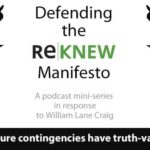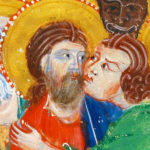We run our website the way we wished the whole internet worked: we provide high quality original content with no ads. We are funded solely by your direct support. Please consider supporting this project.
How do you respond to Matthew 21:1–5?
Jesus commanded his disciples, “Go into the village ahead of you, and immediately you will find a donkey tied, and a colt with her; untie them and bring them to me. If anyone says anything to you, just say this: ‘The Lord needs them.’ And he will send them immediately” (vs. 1-4).
Though this verse is sometimes appealed to by defenders of the classical view, it does not support their view of an exhaustively settled future. For the Father to reveal this to Jesus he need only know all present circumstances: there’s a donkey and a colt tied up right now somewhere in Jerusalem. If the Lord needed to exercise some providential influence to get the owner of the animals to go along with Jesus’ request, that could be easily accomplished. The fact that Jesus speaks in conditional terms—“If anyone says anything to you”—shows that this is not an infallible preview of an unalterable future.
Category: Q&A
Tags: Open Theism, Q&A
Topics: Open Theism
Verse: Matthew 21
Related Reading

How do you respond to 1 Peter 1:1–2?
As I read it, I Pet 1:2 is the thematic statement for the whole chapter. As I will show in a moment, the rest of the chapter unpacks this statement, so the rest of the chapter should be used to interpret this statement. In the rest of the chapter we find that believers… * have…

Podcast: Defending the Manifesto (6 of 10)
Greg responds to challenges by William Lane Craig from Craig’s podcast “Reasonable Faith.“ Greg denies Molinism and discusses the logic of possibility. http://traffic.libsyn.com/askgregboyd/Episode_0061.mp3

What is the significance of Jeremiah 26:2–3?
The Lord tells Jeremiah to prophesy to Israel that they should repent, for “I may change my mind about the disaster that I intend to bring on [Israel] because of their evil doings.” It is difficult to discern what God intended to reveal about himself by claiming he is willing to change his mind if…

Did God Predestine Judas to Betray Jesus? (podcast)
Greg talks about the role Judas played in the crucifixion of Jesus and speculates about his potential for good. Episode 516 http://traffic.libsyn.com/askgregboyd/Episode_0516.mp3

What is the significance of Deuteronomy 9:13–14, 18–20, 25?
The Lord tells Moses “Let me alone that I may destroy them [the Israelites] and blot out their name from under heaven…” (vs. 14). Moses later says to the Israelites, “the Lord intended to destroy you” (vs. 25). Moses interceded for forty days and then tells the Israelites, “the Lord listened to me…” (vs. 19).…

How do you respond to Deuteronomy 30:16–23?
The Lord tells Moses of his impending death and then prophesies that “this people will begin to prostitute themselves to the foreign gods in their midst…breaking my covenant that I have made with them” (vs. 16). The Lord will have to judge them accordingly (vs. 17–18). He then inspires Joshua to write a song for…
